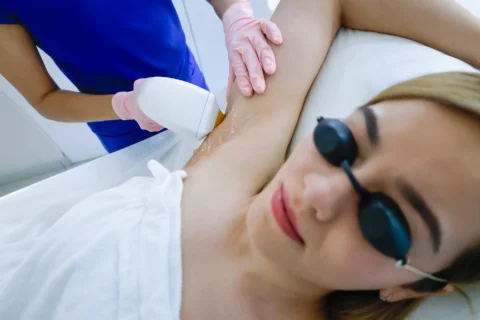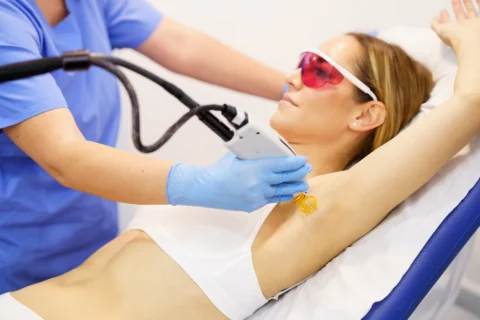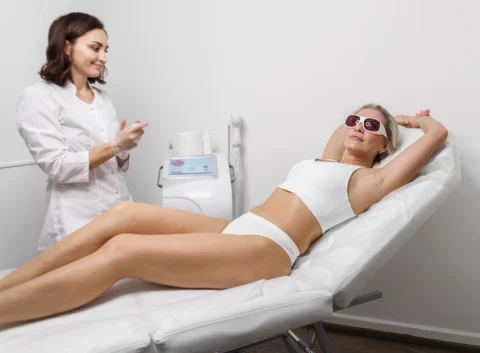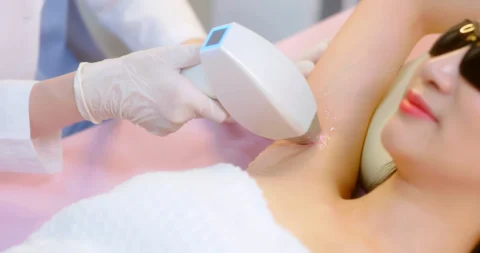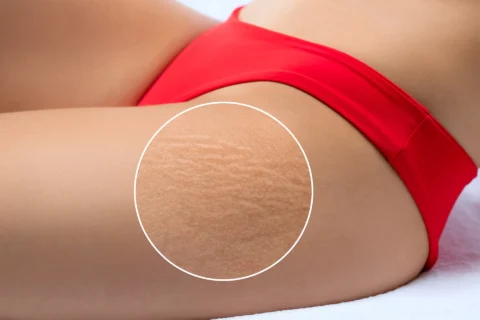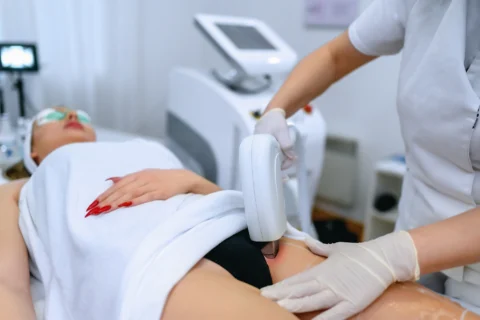For many years, laser hair removal was a procedure that was marketed towards patients with fair skin, and for good reason: for a long time, we simply didn’t have the technology to safely treat dark skin tone patients with the laser hair removal procedure.
However, with advancements in laser hair removal technology, we can now safely and effectively treat patients of any skin and hair type with laser hair removal.
So what is the best laser hair removal machine for patients with dark skin? Patients with dark skin should be looking for trusted and experienced clinics who are equipped with Nd:YAG laser machines, as these are the ideal wavelengths for dark skin treatment.
How Laser Hair Removal Works
Before we can understand why there are different processes involved with laser hair removal for dark skin, it is necessary to understand exactly how laser hair removal works.
Laser hair removal is a procedure that utilizes a laser, or a concentrated beam of light, to remove hair from the body and face. During the procedure, the device is aimed at the skin with unwanted hair. The laser emits from the device, and the light is absorbed by the melanin or the pigment in the targeted hair.
This light becomes heat when absorbed, and the heat travels down the hair follicle to its root. Due to the damage, the root of the hair follicle becomes temporarily or permanently unable to grow hair.
Why Laser Hair Removal Favored Fair Skin and Dark Hair
When laser hair removal was first developed, doctors and technicians found that results worked best on patients who were light-skinned with dark hair.
The reason for this was because of the way the technology worked: as the light goes into the hair follicle due to its attraction to the melanin of the hair, there needed to be a distinct contrast between the pigment of the hair and the pigment of the skin. The greater this contrast, the more successfully the light energy could convert into heat in the hair follicles.
So what happened with patients who didn’t have light skin and dark hair? Simply put, doctors could not guarantee effective hair removal treatments on them, and in many cases, it was dangerous to even try.
Without the advanced technology that we have today, devices that emitted wavelengths that weren’t absorbed into the hair follicle could lead to scarring, blistering, irregular skin color, and more, with some side effects being permanent. Without the sophistication of today’s devices, women of color who wanted hair removal were putting the safety of their skin up for gamble.
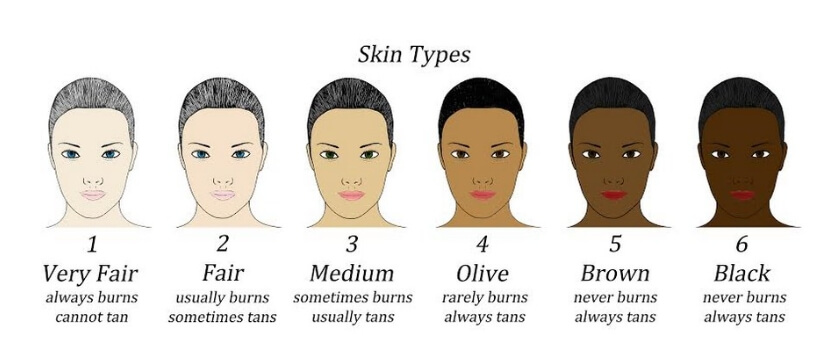
The diagram above is known as the Fitzpatrick skin scale, and it’s the typical scale used to identify skin tones for treatments. While the scale is now considered outdated, it was the original chart for determining skin types, based on a study involving the effects of ultraviolet light on skin types (an outdated chart because lasers actually use infrared light, not ultraviolet light).
With older hair removal technology, only patients who fell under Skin Type 1 and Skin Type 2 could safely undergo treatment. Patients under 3 and 4 could risk it, while patients of 5 and 6 were almost guaranteed an unsafe procedure.
Why Laser Hair Removal is Now Safe for Darker Skin Tones
Thankfully, advancements in hair removal came quickly, and within a few decades doctors were safely offering hair removal to patients of all skin tones. Admittedly, the reason why hair removal for darker skin tones came arrived much later was because companies hadn’t done much research in the relevant markets, and believed they were disinterested in the treatments.
According to Dr. Fran Cook-Bolden, founder of a research facility for medical procedures for people of color, “When lasers were first being developed, they were only used on people with lighter skin types. Companies were aware of the risks [of giving the procedures to people of color] and they didn’t want to be bothered. There was enough need with lighter skin types already, so companies thought, ‘Why take on that additional liability?’”
But what exactly did recent advancements bring to laser devices to make the procedure safe for darker skin? For this we have to understand how lasers are made up – with wavelengths.
Laser devices typically operate with a single wavelength, and the output wavelength of the device makes it better suited for some skin types over other skin types. The original wavelength for hair removal were ruby and argon wavelengths, measured at 694.3 nanometers (nm) and 488 nm respectively.
Since then, the Alexandrite wavelength (755 nm) has become the default wavelength for light skin. The shorter, older wavelengths are now considered dangerous for the skin. The shorter the wavelength, the higher its frequency; the higher the frequency, the more energy carried in each photon.
To make the procedure safe for darker skin, filters needed to be applied to the machines to create even longer wavelengths. By increasing the length of the wavelength, they further lowered its frequency, thus creating lasers with less energy in each photon.
The Differences with Longer Wavelengths
With longer wavelengths, darker skin could safely be treated with hair removal, as the longer wavelength lasers would no longer burn their skin. The longer wavelength lasers are known as the pulsed diode array laser at 810 nm and the Nd:YAG laser at 1064 nm, which is the recommended laser for patients with dark and black skin.
How important is it to make sure that the device and wavelengths you use matches your skin tone? Very important, especially if you have darker skins. While people with fair skin won’t have to worry much about experiencing other wavelengths – other than a less efficient laser treatment for them – people with black skin tones can experience blistering, scarring, and burning from treatments with Alexandrite devices and other wavelengths that aren’t meant for their skin.
It is best to consult with your chosen specialist prior to your procedure to make sure that they have the device that best fits your skin. Less experienced and reputable laser providers will try to get by with a single laser device, claiming a “one size fits all” situation, but this simply isn’t the case.
IPL Machines VS Laser Machines for Dark Skin: Is IPL Suitable for Dark Skin?
One way they will make the “one size fits all” claim is with IPL devices, or intense pulsed light machines. Many people interchange IPL machines and laser machines, but they are actually two different devices. While laser devices work on a precise wavelength, selectively targeting the skin and light hair styles that they were built to treat, IPL machines use a range of wavelengths during the procedure.
This means that an IPL device will hit a patient with wavelengths of 500 to 1000 nm. The entire range of wavelengths will be exposed to the skin at the same time, making it impossible for the light to properly be absorbed into the melanin of the hair follicle. With a broader spectrum of wavelengths, the energy being emitted out of an IPL device will be much less effective than that which comes out of a laser device.
This means that IPL devices are forced to emit higher levels of energy to achieve the same results as laser devices. With higher levels of energy emitted and exposed to the skin, there is a much greater risk of complications, such as burning and blistering of the skin, particularly when used on black skin tones.
IPL does have its uses – it is a great way to treat certain skin issues such as capillaries, redness, and pigmentation, however if a laser hair removal clinic claims to use IPL effective for hair removal, it is best to find another specialist. IPL is not a suitable stand-in for laser when it comes to hair removal, and when performed on a patient with darker skin, it can lead to long-lasting and painful side effects.
Are There IPL Devices That Work on Dark Skin?
If you want to persist with home IPL devices for your hair removal solution, then you’re in luck: there are a few IPL devices on the market that are clinically proven to be safe for dark skin tones.
As IPL devices emit a range of wavelengths and demand more energy to be as effective as laser machines, safe home IPL devices are made to emit much lower intensity ranges, and have certain filters to further weaken the emitted energy.
When searching for an ideal home IPL device for black skin, you should be looking for products that are made with Colorblind RF and ELOS technology features.
- ELOS Technology: Short for Electro-optical Synergy, ELOS technology combines radio frequency (RF) and intense pulsed light (IPL) to better selectively target hair follicles efficiently and safely. This combination of ELOS makes hair removal quicker, easier, and gentler on black skin tones.
- Colorblind RF: RF is a colorblind electric technology, making it ineffective when on its own in IPL devices. It may heat up the skin with the pulses of light, but there will be no selective targeting without ELOS. When paired with ELOS technology, it can effectively reduce hair on dark-skinned users.
You should also be on the look-out for IPL devices that have durable features, as users with darker skin tones will need to use the IPL devices for longer and more frequent sessions for visible results.
The most important factor that makes or breaks a home IPL device’s durability is its bulb. For this, you want to find a device with a Quartz bulb, as these bulbs last much longer than xenon flash bulbs, especially when set on higher temperatures for longer sessions.
Finally, your chosen home IPL device should be FDA-cleared. Safety should be your top priority when searching for home IPL devices for darker skin, so only trust devices that have been cleared by the FDA.
Some home IPL devices that are safe for most skin tones include:
- Silk’N Infinity
- Smoothskin Muse
- Braun Pro 5 IPL
- Lumea Prestige
If your skin tone resembles Skin Type 6 on the Fitzpatrick skin scale, it is strongly recommended not to try any IPL devices at all. Stick with laser machines for maximum safety. And for those with darker skin tones who purchase a home IPL device, remember: while you may see some results, it will never be as effective as what you would achieve with proper hair removal treatment.
The Best Laser Hair Removal for Dark Skin: Nd:YAG

As we said earlier, dark skin patients who are looking for the most effective hair removal machines should look no further than Nd:YAG machines, and in some cases, diode machines.
Simply put, Nd:YAG machines produce the Nd:YAG wavelength, the longest wavelength available, making it an absolutely foolproof solutions for dark skin tone patients. With the longer wavelength, it goes deeper through the epidermis than diode lasers, allowing it to bypass the initial layer of skin pigmentation.
Who can benefit from Nd:YAG devices? Any patient with dark skin tones, as well as patients with light skin tones who have recently tanned their skin. It is without a doubt the safest option available for dark skin tone patients, while also boasting higher success rates than other types of laser machines.
Does this mean that the diode – the other “long” wavelength, although not as long as Nd:YAG –has no place in clinics? This doesn’t seem to be the case. Some dermatologists and hair specialists claim that the diode solution is actually the least painful laser hair removal procedure. This is because the diode energy is delivered much slower than the Nd:YAG, giving the skin more time to cool down from the heat.
Diode devices also typically come equipped with a cooling device that instantly cools down the skin, preventing any risk of overheating or skin damage. One popular diode device is the Lumenis LightSheer device, which is equipped with a built-in suction mechanism that helps distract patient from the pain of the procedure.
Does TRIA Work on Dark Skin?
One popular hair removal machine is the TRIA line of devices, specifically the Tria Hair Removal Laser 4X. Unfortunately, the Tria Hair Removal 4X is designed specifically to be used on patients up to Skin Tone 4.
This means light skin and light to medium brown skin tones can safely experience TRIA devices for hair removal, but anyone with darker skin should avoid these devices at all costs.
Learn more: 8 Reasons Why Laser Hair Treatment May Not Be Working For You
Other Hair Removal Options for Dark Skin
For Indian patients and other patients with brown skin, as well as patients with darker skin tones, Nd:YAG machines are the ideal hair removal solution on the market. It is effective for thick and dense hair, and can be used for bushy hair, facial hair, and body hair removal.
Not only do Nd:YAG machines reduce the hair growth in the targeted area, they also lead to finer and softer hair growth, should it ever begin growing again. However, some individuals with dark skin tones might be considering other hair removal solutions. Here are other ways you can remove your body hair:
- Shaving: Shaving is plain and simple, however, it is an easy solution with short-term results. The hair is only gone from your body until it can regrow, and when it grows back it leaves an awkward and uncomfortable stubble that you nor your partner will enjoy feeling.
- Threading and Waxing: Threading and waxing salons are quite popular, especially for individuals who aren’t looking for the long-term commitment of a series of hair removal sessions. However, like shaving, threading and waxing do not permanently destroy the hair follicle. They may lead to hair follicle removal, which only prompts the regrowth of the hair follicle rather than paralysis.
- Electrolysis: Another safe and effective method for hair removal of unwanted body hair in dark skin individuals is electrolysis. Electrolysis is a great solution for those who aren’t ready for laser hair removal, especially amongst patients with darker skin who are generally more prone to folliculitis, or excess ingrown hairs. Advantages of electrolysis include permanent unwanted hair removal, hair removal along any part of the body, and effective treatment on all skin and hair pigment.
Schedule Your Laser Hair Removal with Ethos Spa Today

Want to know more about laser hair removal for dark skin? Looking for a laser specialist you can trust in the New Jersey area? At Ethos Aesthetics + Wellness, we have treated countless patients of all skin and hair types for hair removal.
We understand the importance of matching patients with the best laser device suited for their hair and skin, and will always make sure that patient safety and comfort is our top priority.
Call us or contact us through our website today, and find out why laser hair removal is the perfect solution for all your unwanted body hair needs!


